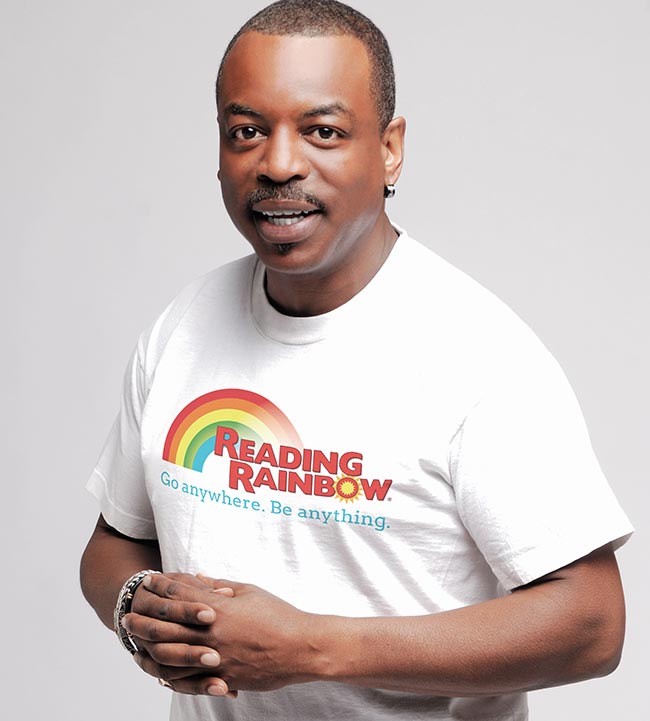The Brightly Interview: LeVar Burton
by Laura Lambert
The fruit of Reading Rainbow’s groundbreaking $6.4-million Kickstarter has just come to bear. Earlier this month, RRKidz Inc. (the company behind the Reading Rainbow brand) debuted “Skybrary School,” a digital platform for elementary school teachers to engage and inspire young readers. “I’m really really proud of it,” says RRKidz Inc. co-founder, and star of the original “Reading Rainbow” PBS show, LeVar Burton. “It helps the Reading Rainbow brand continue its tradition as a much-utilized resource in our nation’s classrooms.”
Few have done more to bring the love of reading to every child, everywhere than Burton, a beloved storyteller across the generations and a children’s book author in his own right. Below we chat with him about favorite books, beloved characters and his passion for the written word.
What books have you been most excited about lately?
I’m always excited about whatever science fiction I’m reading — and I’m always reading The Year’s Best Science Fiction. It’s a compendium of short fiction edited by Gardner Dozois. I like short fiction in all genres. It’s a masterful exercise — to write exciting, compelling, short stories.
In addition, I really like Ta-Nehisi Coates’ Between the World and Me. It’s a really beautiful book.
Which fictional character do you most identify with?
I love a good underdog. An underdog who overcomes — I heavily identify with that archetype. Bilbo Baggins, there’s a quintessential underdog who overcomes. Holden Caulfield is an underdog who overcomes. It’s a pretty common trope in literature, I think because most of us see ourselves in some way as an underdog. We all like to identify with that part of ourselves that is looking to overcome.
What was your favorite book as a child — or to read to a child, now?
Captain Courageous, by Rudyard Kipling, was the experience that hooked me. I didn’t quite understand it then, but I know now about the sadness that I experienced when I turned the last page. That’s the inevitable depression that I still feel when I finish a good piece of fiction.

What’s the best thing about reading with kids?
Well, my “kids” are now 35 and 21, but I still read with kids and to kids. I’m acutely aware that I’m engaging in the ancient tradition of storytelling. That lap experience defines the art of passing, from one generation to another, our connection to the written word. That’s an experience we all have in common. We have all been read to as children. It’s an elementally human experience.
Who inspired your love of reading?
That’s easy — my mom, Erma Gene Christian. My mom was an English teacher and a voracious reader, so I grew up in a household where reading was mandatory. Also, I grew up in a household where I saw my mother reading constantly. I was lucky that my mother showed me through example that reading was important — that it was part of the human experience. We took two newspapers when I was a kid, the morning and evening edition, and she always has several books she’s reading simultaneously, flipping from book to book.
In this world that is dominated by digital games and distractions related to extended screen time, we need to remind ourselves as parents — or those responsible for the care and feeding of children — that we need to be seen reading, whether a digital book or a physical hard copy. It is important to be seen reading.
When did you know you wanted to be a writer?
I remember it being pointed out to me that I had the makings of a writer in the 3rd or 4th grade. I’ve always written speeches and screenplays and I had wanted to write a children’s book for a long time. But when “Reading Rainbow” was a television series, we made maybe 10 or 12 shows a year, and I didn’t’ want to take a slot away from a children’s book author who made their living as a children’s book author. Once we moved into the digital realm and our library services were structured much differently, then it became an opportunity to combine my love of children’s literature and writing.
Finish this sentence, “Reading a good book is better than…”
Reading a good book is better than reading a so-so book. And reading a so-so book is better than not reading a book at all!
This interview has been edited for length and clarity.
